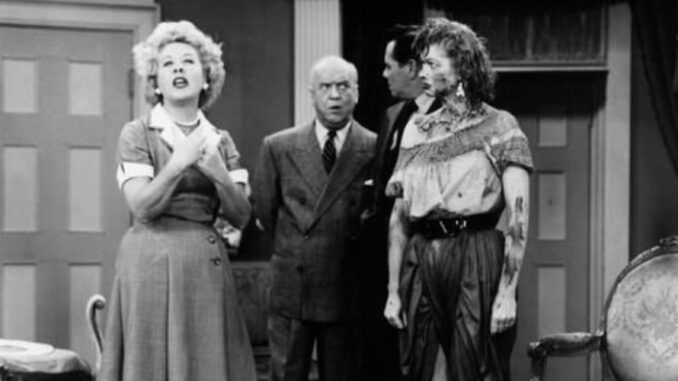
Introduction
I Love Lucy is a beloved classic sitcom that has entertained audiences for generations. The show’s iconic duo, Lucy Ricardo and Ethel Mertz, have become synonymous with friendship, laughter, and chaos. However, if we were to examine their relationship through a modern lens, we might notice some behaviors that would raise eyebrows. Let’s delve into 10 aspects of their friendship that likely wouldn’t be tolerated today.
1. The Constant Bickering
Lucy and Ethel were constantly bickering, often resorting to insults and physical comedy. While their playful banter was undoubtedly funny, it also bordered on mean-spiritedness. In today’s world, such constant negativity would be seen as toxic and harmful to a friendship.
2. The Lack of Boundaries
Lucy and Ethel had no qualms about invading each other’s personal space. They would barge into each other’s homes without knocking, snoop through each other’s belongings, and even share intimate details about their lives with complete strangers. In today’s society, such behavior would be considered a major invasion of privacy.

3. The Enabling Behavior
Lucy and Ethel often enabled each other’s impulsive and reckless behavior. They would encourage each other to pursue outlandish schemes, even when it was clear that they were likely to fail. This type of enabling can lead to negative consequences and hinder personal growth.
4. The Jealousy and Competition
Lucy and Ethel were often jealous of each other’s successes, both personal and professional. They would compete for attention, sabotage each other’s plans, and even resort to petty gossip. In today’s world, such behavior would be seen as immature and harmful to a friendship.
5. The Lack of Emotional Support
While Lucy and Ethel were always there to laugh and have fun, they were often absent when it came to providing emotional support. They would often dismiss each other’s feelings or make light of their problems. In today’s society, it is understood that true friends offer emotional support and understanding.
6. The Physical Comedy
The physical comedy in I Love Lucy was often over-the-top and sometimes even violent. The characters would frequently shove, slap, and pull each other’s hair. While this was considered humorous in the 1950s, it would be seen as unacceptable today.
7. The Stereotypical Roles
Lucy and Ethel were often portrayed in stereotypical roles. Lucy was the ditzy housewife, while Ethel was the more sensible and practical one. These stereotypes can be harmful and perpetuate negative gender roles.
8. The Lack of Diversity
The cast of I Love Lucy was predominantly white, and the show often relied on stereotypes and generalizations about different cultures. In today’s diverse world, such representation would be considered outdated and insensitive.
9. The Focus on Domesticity
The show often focused on domestic tasks and chores, such as cooking, cleaning, and laundry. While these activities were important in the 1950s, they are not the sole focus of women’s lives today.
10. The Lack of Career Ambitions
Neither Lucy nor Ethel had significant career aspirations. Their primary focus was on their families and domestic lives. In today’s world, women are expected to pursue their dreams and ambitions, both personally and professionally.
Conclusion
While I Love Lucy remains a beloved classic, it’s important to acknowledge that the dynamics of Lucy and Ethel’s friendship would not be considered acceptable today. By examining these 10 aspects of their relationship, we can gain a deeper understanding of how societal norms and expectations have evolved over time.
FAQs
-
Why did Lucy and Ethel’s friendship endure despite its flaws?
- Lucy and Ethel’s friendship was built on a foundation of shared experiences, laughter, and mutual understanding. Despite their differences and frequent disagreements, they were always there for each other.
-
How did the show’s writers balance humor with problematic themes?
- The writers of I Love Lucy were skilled at crafting humorous situations that were both entertaining and thought-provoking. They often used satire and exaggeration to highlight societal issues, while still maintaining a lighthearted tone.
-
What can we learn from Lucy and Ethel’s friendship?
- We can learn that true friendship is about more than just laughter and fun. It’s also about empathy, understanding, and support. While Lucy and Ethel’s friendship had its flaws, it also taught us the importance of loyalty and forgiveness.
-
How has the portrayal of female friendships changed in television since I Love Lucy?
- The portrayal of female friendships in television has evolved significantly since I Love Lucy. Today, we see more complex and nuanced relationships between women, with a focus on their individual strengths and aspirations.
-
What impact did I Love Lucy have on television and popular culture?
- I Love Lucy was a groundbreaking television show that paved the way for future sitcoms. It introduced innovative techniques, such as the multiple-camera setup and live audience, and it helped to popularize the sitcom format. The show also had a significant impact on popular culture, influencing fashion, language, and social norms.